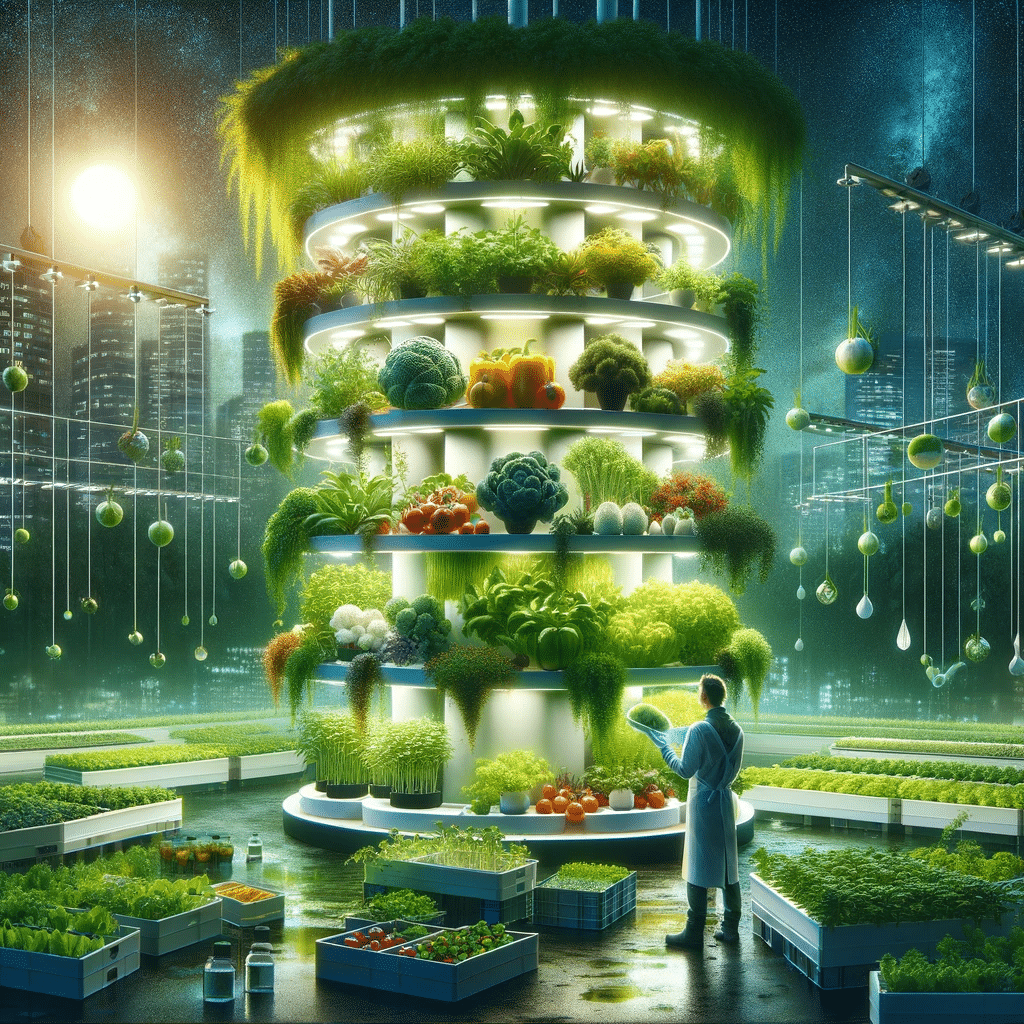
Eco-Friendly Gardening: Nurturing the Planet with Hydroponic Vertical Farms
Imagine a world where gardens flourish without depleting the Earth's resources, where bountiful harvests don't come at the cost of our environment. Picture a future where we nurture the planet while we nurture our bodies. It's not a dream; it's a reality unfolding before our eyes, thanks to eco-friendly gardening practices like hydroponic vertical farming.
Now, you might wonder, what exactly is eco-friendly gardening, and why is it crucial in our rapidly changing world? Well, let's break it down. Eco-friendly gardening is like being the Earth's best friend – it's about gardening with a deep sense of responsibility towards our planet. In an era where sustainability is not just a buzzword but a necessity, eco-friendly gardening becomes our contribution to a greener, healthier Earth.
Traditional farming, with its heavy reliance on vast tracts of land, excessive water usage, and chemical fertilizers, can often be a burden on our environment. It's like borrowing more than we can ever repay. This is where hydroponic vertical farming steps in as a beacon of hope.
Hydroponic vertical farming is more than a method; it's a revolution. It's like taking farming to new heights, literally. Instead of sprawling fields, it utilizes vertical space, enabling us to grow crops in stacked layers. It's like creating a vertical garden of abundance, where each plant has its place, and resources are used with surgical precision.
But what makes hydroponic vertical farming eco-friendly? Well, that's where the magic happens. It's like a well-choreographed dance where every element plays its part. In this method, plants are grown without soil, which means no soil erosion or depletion. It's like ensuring the Earth's skin remains healthy and intact.
Hydroponics also uses significantly less water compared to traditional farming. It's like turning off the tap when you don't need it. Water is recirculated through the system, minimizing waste and conserving this precious resource. And with controlled environments, the need for harmful pesticides is greatly reduced, making it a win-win for both your health and the environment.
As we embark on this journey through eco-friendly gardening with hydroponic vertical farms, you'll discover how this method is changing the way we look at food production. It's a celebration of self-sufficiency, sustainability, and a brighter future. Are you ready to join this green revolution? Let's explore how you can nurture the planet while enjoying the fruits of your labor.
The Green Advantages of Hydroponic Vertical Farming
Now that we've dipped our toes into the refreshing waters of eco-friendly gardening, let's dive deeper into the green advantages offered by hydroponic vertical farming. It's like opening a treasure chest of sustainable possibilities, each more precious than the last.
First and foremost, hydroponic vertical farming is like giving nature a helping hand. By growing crops in controlled environments, we reduce the impact of adverse weather conditions. It's like providing a cozy shelter for your plants, shielding them from the scorching sun, torrential rain, or biting frost. This means less crop loss due to extreme weather, leading to higher yields and less strain on the environment.
But what truly sets hydroponic farming apart is its water efficiency. Traditional farming can be like a leaky bucket, losing water to evaporation and runoff. Hydroponics, on the other hand, is like sipping water through a straw – precise and conservative. The water used in the system is recirculated, with minimal wastage. It's a remarkable feat in a world where water scarcity is becoming an alarming concern.
Furthermore, hydroponic vertical farms can be set up in urban areas, closer to consumers. This reduces the need for long transportation routes and the associated carbon emissions. It's like cutting out the middleman and delivering fresh produce straight from the farm to your table. The result? A smaller carbon footprint and a fresher, more sustainable food supply.
Chemical fertilizers, a common fixture in traditional agriculture, can wreak havoc on our ecosystems. Hydroponics relies on nutrient-rich water solutions, reducing the need for synthetic fertilizers. It's like nourishing your plants with a balanced diet instead of fast food – healthier for them and for the environment.
Now, you might be wondering about pests and pesticides. Hydroponic vertical farming uses integrated pest management, which can be like having nature's own pest control squad. Beneficial insects are introduced to keep harmful pests in check, minimizing the need for chemical pesticides. It's like orchestrating a delicate ballet of nature to maintain a healthy and balanced ecosystem.
As we continue our journey through the world of hydroponic vertical farming, you'll uncover more about its eco-friendly aspects and how it's changing the face of agriculture. It's more than just a farming method; it's a commitment to a greener, more sustainable planet. So, are you ready to explore the future of food production and embrace the green advantages of hydroponic vertical farming? Let's cultivate a better world together.
Cultivating a Sustainable Future
As we delve deeper into the world of hydroponic vertical farming, it becomes evident that this eco-friendly gardening method holds the keys to a sustainable future. It's like tending to the roots of a plant, nurturing its growth for the long term.
But the benefits of hydroponic vertical farming reach far beyond individual gardens. It's like planting a seed of change that can ripple through entire communities and even countries. As more people embrace this sustainable approach to food production, we reduce our environmental footprint and make strides toward a greener planet.
Imagine urban landscapes dotted with vertical farms, like oases of green amidst concrete jungles. It's like reimagining our cities as hubs of self-sufficiency, where fresh produce is grown locally, reducing the need for long-distance transportation. This not only cuts down on emissions but also promotes a stronger sense of community.
Hydroponic vertical farming is also a solution to the challenge of feeding a growing global population. As our numbers swell, so does the demand for food. Traditional farming practices strain our land and water resources. It's like trying to fit an elephant in a phone booth – unsustainable and impractical. Hydroponics offers a more efficient way to meet the world's food needs without compromising the environment.
Additionally, the concept of "farm to table" gains new meaning in the world of hydroponic vertical farming. It's like connecting directly with the source of your food, knowing where it comes from and how it's grown. This transparency fosters trust and encourages responsible consumption.
So, what can you do to be a part of this sustainable revolution? It's like taking a small step that leads to a giant leap for our planet. You can start by exploring hydroponic gardening, whether on your balcony, in your backyard, or as part of a community initiative. By supporting local hydroponic farms and choosing produce grown with care for the environment, you contribute to a more sustainable food system.
As we conclude our journey through the world of eco-friendly gardening and hydroponic vertical farming, remember that every seed you plant, every crop you harvest, is a step towards a brighter, greener future. It's a future where we nurture the planet as it nurtures us, where gardening isn't just a hobby but a commitment to the well-being of our home – Earth. So, let's roll up our sleeves and cultivate a sustainable future together.
